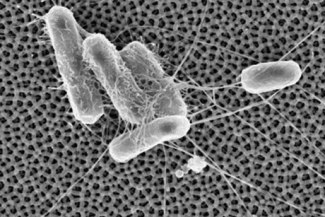Researchers at Rensselaer Polytechnic Institute and Cornell University have devised a new nanoscale surface which uses an electrochemical anodization process in order to prevent the surface attachment of bacteria.
 Nanoporous alumina repels E. coli cells (Guoping Feng)
Nanoporous alumina repels E. coli cells (Guoping Feng)
The research published in the Biofouling journal focuses on the formation of nanoscale pores which alter the surface energy and electrical charge of a metal surface. A repulsive force is exerted on the bacterial cells, which prevents the attachment of bacteria and the formation of a biofilm. The size of the nanoscale pores formed can be as small as 15 nanometers.
The application of the anodization process to aluminum created a nanoporous surface, known as alumina. This surface proved effective in preventing the attachment of two popular bacterial species: Listeria monocytogenes and Escherichia coli O157:H7.
It’s probably one of the lowest-cost possibilities to manufacture a nanostructure on a metallic surface.
Carmen Moraru, senior author of the research and associate professor of food science
Nanoporous alumina could find key applications in the fields of biomedicine and food processing in order to provide low-cost solutions in order to prevent the surface attachment of bacteria. “The food industry makes products with low profit margins. Unless a technology is affordable it doesn’t stand the chance of being practically applied," said Moraru.
The researchers also studied the effect of bacterial repulsive forces based on the changes in nanopores. According to Moraru, any bacterial buildups attached to the surfaces or biofilms in hard-to-reach equipment parts or biomedical clean rooms can be prevented using anodized metals.
Other techniques for preventing bacterial attachment include bactericides and chemicals. However, these techniques have limited applications with respect of food processing. As a result, for this application surfaces must be developed based on food safety guidelines.
Anodized metals can also be applied to marine applications such as maintaining algae-free ship hulls. The research team is currently working on the investigation of the surface's repulsive effect on other bacteria, and the development of other kinds of anodized materials.